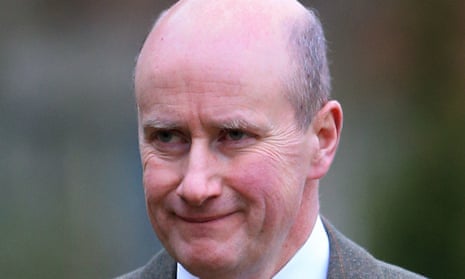Few other political figures might be better equipped than Christopher Geidt for the role of No 10’s new independent adviser on ministerial standards.
After Simon Case, a former private secretary to Prince William, took over last year as head of the civil service, some might be tempted to characterise Lord Geidt’s appointment as the latest stage in a royal takeover at the heart of government.
But having served as the Queen’s private secretary for 10 years and as an army intelligence officer before that, Geidt will draw on an even greater reservoir of diplomatic skills and ability to navigate intrigue as he takes on his first task of conducting an inquiry into the Downing Street flat refurbishment.
Described in the past by one person familiar with his royal role as “the most discreet man you could ever meet”, Geidt, in his time as the Queen’s adviser on political and constitutional issues, acted as her line of communication to not only the UK government, but 15 Commonwealth states.
Yet as far as the British public was concerned, for much of the time he was practically invisible, apart from rare moments such as when the spotlight fell on his discussions with senior civil servants before an unusual public intervention by the Queen in the final days of Scotland’s independence referendum campaign.
Born in London in 1961, Geidt was educated privately in Oxford and Scotland before studying at Trinity Hall, Cambridge, and later at Sandhurst, after enlisting in the Scots Guards.
He was subsequently appointed to an army intelligence post, serving at the height of the Bosnian war as part of the European Community’s monitoring mission in Sarajevo. In the same region he served as private secretary to the UN secretary general’s special envoy to the Balkans, Carl Bildt, at a time of delicate negotiations for the removal of Bosnian Serb war criminals.
“Suave and charming, very proper, clipped and British with a regimental tie, but also with a touch of the spook about him,” was how one former colleague described him to the Guardian in 2013.
It wasn’t the first time that the “spook” label had popped up in relation to Geidt. He won substantial damages after he and a fellow army college brought a 1991 libel action against Central TV and the journalist John Pilger over a documentary that they said accused them of having been SAS members training Pol Pot’s Khmer Rouge.
But the Labour MP Bob Cryer used parliamentary privilege to query why Geidt had turned up on a mission to observe Vietnamese troops pull out of Cambodia in 1989. “Surely not MI6?” asked Cryer during a Commons debate.
A spokesperson for Buckingham Palace has previously said: “He didn’t comment on the accusations at the time and, as then, he will let the legal judgments speak for themselves. We won’t comment on the questions relating to [Geidt’s] work before joining the royal household.”
Geidt joined the royal household in 2002, and served as the Queen’s private secretary between 2007 and 2017. As well as during Scotland’s referendum, his responsibilities in the role and contact with senior civil servants were the focus of interest when a hung parliament was delivered by the 2010 general election.
He stepped down from his royal role in 2017, a consequence of what reports at the time suggested had been a power struggle, and became Lord Geidt of Crobeg in the County of Ross and Cromarty.
A biographical note released by the government lists his present responsibilities as chair of King’s College London and chair of the multinational asset management company Schroders. It fails to mention another private sector role – and one close to the heart of Britain’s arms trade – as a member of the international advisory board of BAE Systems. Critics of that trade are likely to see an irony in his new appointment as an adviser on ethical standards.
